Background
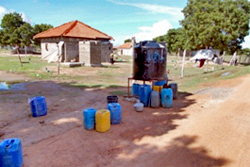
Killinochchi district is located in the central part of the Northern Province falling within the Dry Zone of Sri Lanka where a tropical dry climate is prevalent. The District is one of the most poorly developed in the country.
Killinochchi receives low rainfall throughout the year. Annual rainfall in the district varies from 1250–1500 mm. However, the area experiences heavy rains during the months of October to February, the North East monsoonal season. Villages in Killinochchi have been affected by the 30 year conflict, resulting in damage to infrastructure such as houses, water supply systems, common buildings and schools. A large number of families in these villages have no access to water during the dry season.
Objectives
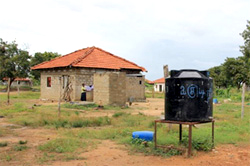
Overall, this project will contribute towards creating access to water, introducing sustainable use of water with rainwater harvesting in a water scarce village in Killinochchi district. More specifically, the action actively links with local and national institutions and community organizations to enhance sustainable access to water for domestic needs.
Project Approach
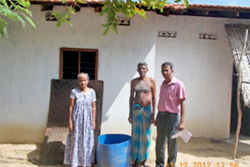
The implementation methodology of the project follows a "people's participatory process" in establishing RWH systems for individual families and in community buildings. The project also aims to provide RWH facilities to selected community buildings such as pre-schools and schools. The key project output is the provision of RWH systems (e.g. gutters, downpipes and plastic tanks) and ground water recharging facilities to families who do not have access to safe drinking water during the dry season. The establishment of the RWH systems will be by the home owners themselves, with technical assistance from UN-Habitat field staff. Hence there will be a contribution of labour by the families towards the initiative.
The families are being trained on the establishment, use and maintenance of the RWH systems and ground water recharge. The sustainability of the project will be ensured by training community leaders in CBOs and the divisional and village level administration that will monitor the utilization of the RWH units and provide necessary advisory/technical support on maintenance to families.
Key Results
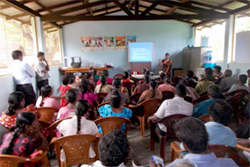
- ・Conduct a baseline survey of the identified village in the Northern Province of Sri Lanka.
- ・Conduct awareness programmes on rainwater harvesting and ground water recharge and establish working committees in the village.
- ・Network with local and national partners working on rain water harvesting issues.
- ・Training of artisans and community leaders on rain water harvesting methods.
- ・Awareness raising and training of communities on ground water recharge activities (e.g. Digging of trenches across home gardens)
- ・Construction of recharging systems and rainwater harvesting tanks.
- ・Monitoring and evaluation.
Development Partners/ Partners
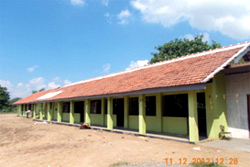
Development Partners: The Coca Cola Foundation (TCCF)
Partners: Rainwater Harvesting Forum of Sri Lanka, Local Governments, Local Authorities, Community Organizations and Communities
- Catalytic Support to Peacebuilding in Sri Lanka
- Preparation of the Resettlement Plan (RP) for Households Affected by the Rehabilitation of the Kelani Valley (KV) Railway Line in Sri Lanka (Phase I)
- Emergency Shelter Relief for Flood and Landslide Affected Households in Kalutara and Galle Districts of Sri Lanka
- The State of Sri Lankan Cities Report
- Human Development Initiative through Empowerment and Settlement Improvement in the Plantation Settlements in Sri Lanka
- Indian Housing Project in Central and Uva Provinces
- Emergency Shelter Relief for Flood Affected Families in Colombo and Gampaha Districts in Western Province, Sri Lanka (Completed)
- Sustainable Resettlement through Community-Driven Improvement of the Learning Environment in Mannar District, Sri Lanka
- Support My School: Supporting Schools in Northern Sri Lanka with Access to Water and Sanitation Facilities (Completed)
- Project for Rehabilitation of Community Infrastructure, Improvement of Livelihoods and Empowerment of Women in the Northern and Eastern Provinces (RCI) (Completed)
- Rainwater Harvesting in a Water Scarce Small Village in Northern Sri Lanka (Completed)
- Climate Resilient Action Plans for Coastal Urban Areas (Completed)
- Disaster Resilient City Development Strategies for Sri Lankan Cities (Completed)
- Disaster Resilient City Development Strategies for Four Cities in the Northern and Eastern Provinces of Sri Lanka (Phase II) (Completed)
- Rehabilitation of Community Infrastructure and Facilities in the Conflict Affected Areas in Northern Province of Sri Lanka (Completed)
- Improving Living Conditions in Returnee Areas of Sri Lanka through Housing (Completed)
- Indian Housing Project (Completed)
- Support to Conflict Affected People through Housing (Completed)
- Shelter Support to Conflict-affected IDPs in the North of Sri Lanka (Completed)
- Jaffna Tsunami Recovery and Reconstruction Project (Completed)
- Community Recovery and Reconstruction Partnership to Support the People's Process of Rebuilding (Completed)
- Reconstruction of Fish Market in Galle (Completed)
- Rebuilding Community Infrastructure and Shelter in Tsunami-Affected Areas (Completed)
- Lunawa Lake Environment Improvement and Community Development Project (Completed)
- Pro-Poor Partnerships for Participatory Settlement Upgrading (Completed)
- Early Recovery Shelter for IDPs in Batticaloa (Completed)
- Support to the Urbanization Framework
- Post Disaster Housing Coordination Project (Completed)
- Sustainable Cities Programme (Completed)
- Urban Governance Support Project (UGSP) (Completed)
- Rebuilding Communities in North East Sri Lanka (Completed)
- Urban Poverty Reduction Strategy - Colombo (Completed)






































